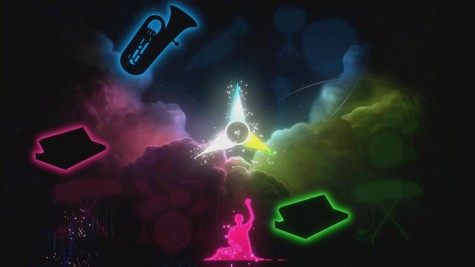“Fantasia” takes Xbox Kinect to a new level
December 11, 2014
Rhythm-based video games of the past have typically been easy to grasp in concept, whether they be strumming a plastic guitar or dancing on a plastic mat. It can safely be said, however, that nothing has attempted to give the player control of the music in quite as peculiar of a way as “Fantasia: Music Evolved.”
The game uses the Xbox’s Kinect Camera to allow the player to interact with the virtual environment. The user controls an onscreen cursor called “The Muse” that can add musical properties to the world, such as by crafting a drum solo to accompany a jazz piece using musical clams.

Song performances replicate the “Sorcerer’s Apprentice” scene from the original 1940 Fantasia film. The player must perform several types of on-screen cues that replicate the movements of a conductor to an orchestra. While it’s impossible to fail these sections, whether or not the music actually plays is completely dependent on the player’s accuracy in hitting each note. Every on-screen cue is associated with a specific instrument of the track, causing a fulfilling sense of power to accompany the player with each perfectly timed swipe.
There is a brilliant twist in Fantasia’s music. During each song, the player can alter the original tracks and substitute them with carefully created remixes that radically change the instrumentation of the song. The greatest part about this feature is that these new versions all work on a musical level and blend perfectly. Songs that, to some, may seem annoying and repetitive, like “Levels” by AVICII, suddenly sound fresh when blending the electronic sounds of the keyboards with a chiptune beat.

Composition spells, which are used to further distort or customize the song, can be awarded to the player. Some composition spells require the player to bend a physical embodiment of the music. He or she must stretch and compress this object to distort and accentuate specific parts of the song. One specific spell creates a ring comprised of a sample of the vocal track in “Feel Good Inc.” by Gorillaz, giving the player the opportunity to alter the frequency and word order of the rap segments. When done competently, these spells give the song a prominent sense of personality. Like a snowflake, no two takes on a song in Fantasia will sound quite the same.
Fantasia is a very hard game to wrap your mind around without playing it yourself. It departs from Harmonix’s previous, more traditional musical game efforts such as Rock Band and Dance Central in favor of something truly unique and innovative for rhythm games. At times, Fantasia can feel less like a game and more like an exploration of music as an art form. Anyone who loves music would be doing themselves a great injustice to dismiss “Fantasia: Music Evolved.”







